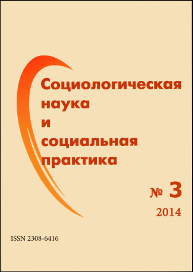«Мегаполис» и «глубинка» как модели ценностных ориентаций и политических установок россиян
Выражение признательности
Исследование проведено в рамках проекта «Гражданский активизмновые субъекты общественно-политического действия» (2014 г.) при поддержке Некоммерческого Фонда — Института социально¬экономических и политических исследований
Для цитирования
Трофимова И. Н. «Мегаполис» и «глубинка» как модели ценностных ориентаций и политических установок россиян. — Социологическая наука и социальная практика, 2015. № 3. С. 60-78.
Аннотация
В статье исследуются вопросы влияния поселенческого фактора на формирование ценностных ориентаций и связанных с ними политических установок россиян. Для России характерна глубокая межпоселенческая дифференциация, что нашло своё отражение в ти пологизации поселений, учитывающей не только структурные элементы, но также уровень их развития. Агломерации Москвы и Санкт-Петербурга стоят на вершине в иерархической системе городов и в целом всех поселений, откуда идёт распространение инноваций в социальном пространстве России — от крупнейших и более развитых к менее крупным и развитым типам поселений. Различные типы поселений обусловливают специфику ценностных ориентаций, рассматриваемых в статье как модели «мегаполиса» и «глубинки». Рассмотренные модели «мегаполиса» и «глубинки» позволяют выявить ценности как объединяющие, так и разделяющие россиян, к тому же находящиеся в сложном и противоречивом взаимодействии и постоянной динамике. Большинство россиян едины в своём стремлении к социальной справедливости и стабильности. В то же время жителей мегаполиса отличает более выраженная ориентация на индивидуальные, рациональные, активистские ценности, а жителей глубинки, напротив, на коллективистские, нормативные, патерналистские. Ценностная структура мегаполиса также отличается своим разнообразием, одновременным присутствием ценностей и установок либеральной, консервативной и социал-демократической направленности, что предполагает возможность выбора и, следовательно, большей индивидуальной свободы. Если мегаполисы концентрируют ресурсы для выработки новых ориентиров, в известной степени формируя в настоящем ценности будущего, то глубинка обеспечивает их устойчивость и преемственность, и лишь баланс этих двух противоположностей гарантирует динамичность и преемственность социального развития.
Ключевые слова:
поселенческий фактор, типы поселений, ценностные ориентации, политические установки, модели
Литература
Бурдье П. Социология политики / Сост., общ. ред. и предисл. Н. А. Шматко. М.: Socio-Logos, 1993. — 336 с.
Зубаревич Н. Модернизация и российское пространство // Доклад о развитии человеческого потенциала в Российской Федерации за 2011 г. / под ред. А. А. Аузана и С. Н. Бобылева. М.: ПРООН в РФ, 2011. — С. 130 — 141.
Ильин В. И. Глубинка как социологическая категория // Материалы IV Очередного Всероссийского социологического конгресса «Социология и общество: глобальные вызовы и региональное развитие» [Электронный ресурс] // Российское общество социологов URL: http://www.ssa-rss.ru/files/ File/congress2012/part75. pdf (дата обращения: 25.07.2012).
Инглхарт Р., Вельцель К. Модернизация, культурные изменения и демократия Последовательность человеческого развития М: Новое издательство, 2011. — 462 с.
Кастельс М Информационная эпоха: экономика, общество, культура. М.: ГУ ВШЭ, 2000. — 606 с.
Мудрик А. В. Социальная педагогика: Учеб. для студ. пед. вузов / под ред. В. А. Сластенина. М.: Издательский центр «Академия», 2000. — 192 с.
Муханова М Н, Жвитиашвили А Ш и др. Российское село: Социально-структурные процессы от прошлого к настоящему. М.: Книжный дом «ЛИБРОКОМ», 2014. — 304 с.
Россия регионов: в каком социальном пространстве мы живём? / Независимый институт социальной политики. М.: Поматур, 2005. - 277 с.
Россман В. В поисках Четвёртого Рима: Российские дебаты о переносе столицы. М.: Изд. дом НИУ ВШЭ, 2014. — 288 с.
Устойчивое развитие и социально-экологические параметры качества жизни / под ред. А. И. Зеленкова. Минск: БГУ, 2011. — 292 с
Яницкий О. Н. Социальные движения: теория, практика, перспектива. М.: Новый хронограф, 2013. — 360 с.
Changing Values and Beliefs in 85 Countries: Trends from the Values Surveys from 1981 to 2004. Leiden: Brill, 2008. — 274 p.
Giddens A. Central Problems in Social Theory. Action, Structure, and Contradiction in Social Analysis. London: MacMillan, 1979. — 294 p.
Feldman S. Values, Ideology, and Structure of Political Attitudes // Oxford Handbook of Political Psychology. 2003. — 480 p.
Rokeach M. Understanding Human Values: Individual and Societal. NY: The Free Press, 1979. — 230 p.
Зубаревич Н. Модернизация и российское пространство // Доклад о развитии человеческого потенциала в Российской Федерации за 2011 г. / под ред. А. А. Аузана и С. Н. Бобылева. М.: ПРООН в РФ, 2011. — С. 130 — 141.
Ильин В. И. Глубинка как социологическая категория // Материалы IV Очередного Всероссийского социологического конгресса «Социология и общество: глобальные вызовы и региональное развитие» [Электронный ресурс] // Российское общество социологов URL: http://www.ssa-rss.ru/files/ File/congress2012/part75. pdf (дата обращения: 25.07.2012).
Инглхарт Р., Вельцель К. Модернизация, культурные изменения и демократия Последовательность человеческого развития М: Новое издательство, 2011. — 462 с.
Кастельс М Информационная эпоха: экономика, общество, культура. М.: ГУ ВШЭ, 2000. — 606 с.
Мудрик А. В. Социальная педагогика: Учеб. для студ. пед. вузов / под ред. В. А. Сластенина. М.: Издательский центр «Академия», 2000. — 192 с.
Муханова М Н, Жвитиашвили А Ш и др. Российское село: Социально-структурные процессы от прошлого к настоящему. М.: Книжный дом «ЛИБРОКОМ», 2014. — 304 с.
Россия регионов: в каком социальном пространстве мы живём? / Независимый институт социальной политики. М.: Поматур, 2005. - 277 с.
Россман В. В поисках Четвёртого Рима: Российские дебаты о переносе столицы. М.: Изд. дом НИУ ВШЭ, 2014. — 288 с.
Устойчивое развитие и социально-экологические параметры качества жизни / под ред. А. И. Зеленкова. Минск: БГУ, 2011. — 292 с
Яницкий О. Н. Социальные движения: теория, практика, перспектива. М.: Новый хронограф, 2013. — 360 с.
Changing Values and Beliefs in 85 Countries: Trends from the Values Surveys from 1981 to 2004. Leiden: Brill, 2008. — 274 p.
Giddens A. Central Problems in Social Theory. Action, Structure, and Contradiction in Social Analysis. London: MacMillan, 1979. — 294 p.
Feldman S. Values, Ideology, and Structure of Political Attitudes // Oxford Handbook of Political Psychology. 2003. — 480 p.
Rokeach M. Understanding Human Values: Individual and Societal. NY: The Free Press, 1979. — 230 p.
Форматы цитирования
Другие форматы цитирования:
Harvard
Трофимова, И. Н. (2015) ’«Мегаполис» и «глубинка» как модели ценностных ориентаций и политических установок россиян’, Социологическая наука и социальная практика, (3), сс. 60-78. доступно на: https://www.socnp.ru/index.php/snsp/article/view/3078 (просмотрено: 30январь2026).
Раздел
Без Названия








